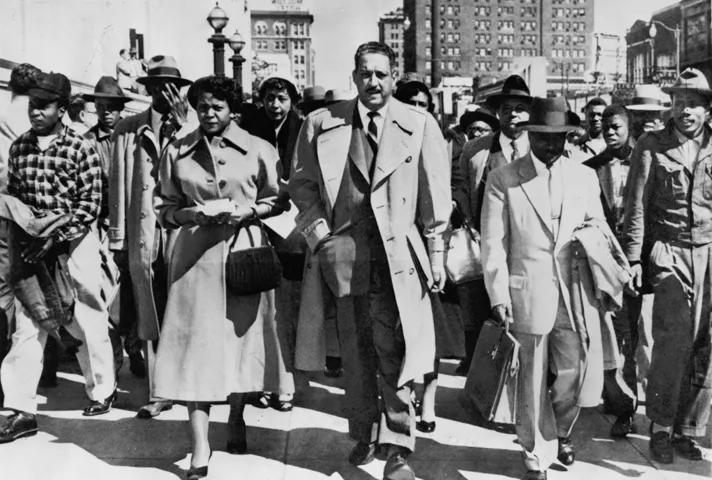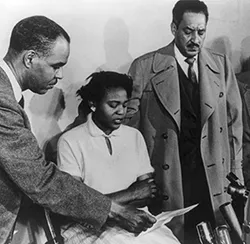
With Autherine Lucy at his side, Thurgood Marshall leads a group of supporters after a 1956 federal court hearing in Birmingham, Alabama. Library of Congress, Prints and Photographs Division, Visual Materials from the NAACP Records.
It was 1952, two years before Brown v. Board of Education declared school segregation unconstitutional. Autherine Lucy had just graduated from a small liberal arts college for African Americans when a classmate made a radical suggestion: Why not enroll as graduate students at the University of Alabama?

Autherine Lucy, in 1956 with future Supreme Court Justice Thurgood Marshall, right, and Roy Wilkins, then director of the NAACP. Photo courtesy of the Library of Congress.
That September, Lucy applied, beginning a six-decade journey of defiance, defeat, persistence, and eventual redemption. Today, her name is honored by a campus clock tower and a university scholarship program. While those who rejected her with racist taunts are long forgotten, Autherine Lucy continues to inspire the students who followed in her footsteps.
“Thinking about the hatred Autherine Lucy endured on my campus, in order for students who look like me to receive a quality education at a premier institution, inspires me to be the best I can be,” said Aleah Brown, a senior at the University of Alabama who last year mentored African American freshmen in a learning community called “Lucy’s Legacy.”
Lucy’s inspiring but little known story is recalled in a new feature on the African American History Month page. While her story involved the federal courts and the assistance of Thurgood Marshall, justice ultimately was won not through the law but through perseverance and the passage of time.
The university initially accepted written applications from Lucy and her friend, Pollie Anne Myers, but officials revoked that acceptance after learning the students were Black. Marshall represented Lucy and Myers in federal court, and in 1955, U.S. District Judge Harlan H. Grooms ordered the students admitted.
“Plaintiffs were denied admission to the University of Alabama solely on account of their race and color,” Grooms wrote. After the U.S. Supreme Court upheld Grooms’ decision, Lucy entered the College of Education in February 1956.
Her career as a University of Alabama student lasted three days. When a mob assailed her with eggs and hateful language on Feb. 6, Lucy hid for hours in a classroom before she was taken to safety. The university suspended her, claiming that the action was taken for her own protection.
After a February 1956 federal court hearing, Marshall and Lucy walked together in an iconic Civil Rights era photo, leading scores of supporters down a street in Birmingham. But Marshall’s attempt to file a complaint against university officials backfired. Lucy was expelled, on the grounds that her legal action had slandered the university.
Marshall tried to console her in a letter. "Whatever happens in the future,” he wrote, “remember for all concerned, that your contribution has been made toward equal justice for all Americans and that you have done everything in your power to bring this about."
Seven years later, in 1963, Vivian Malone and James Hood achieved Autherine Lucy’s vision, integrating the University of Alabama. Then-Governor George Wallace literally tried to block the university doors. In 1967, Marshall became the first African American justice on the U.S. Supreme Court.
Despite her setback, Lucy continued her life outside the public sphere. In June 1956, she married Hugh Foster, a minister whom she met as an undergraduate. They lived in several southern states, and Lucy periodically told her story. The couple returned to Alabama in 1974, and Lucy took a job with the Birmingham school system.
In 1988, when she was invited to speak to a history class, Lucy returned to the campus that had rejected her. Afterward, two faculty members urged university leaders to rescind her expulsion.
“Alabama did just that, sending Lucy a letter in April 1988 inviting her to return,” according to the National Museum of African American History and Culture. “In 1989, Lucy [began] her master's degree in elementary education — the same year her daughter Grazia started her undergraduate studies. In 1992, mother and daughter attended commencement together to receive their degrees.”

Aleah Brown, a University of Alabama senior, says Autherine Lucy's willingness to endure racism and hatred in 1956 "inspires me to be the best I can be."
In 2017, the university dedicated the Autherine Lucy Clock Tower with a plaque that reads, “Autherine's courage made the University of Alabama truly 'one for all.’”
Standing before an adoring crowd at the dedication, Lucy recalled her earlier campus experiences with a mix of humor and candor.
“The last time I saw a crowd like this at the University of Alabama,” she began, trailing off as the audience laughed and applauded. But she then recalled the racial insults she heard as she entered a building to go to class. “When it hurts a little bit, we have to talk about it,” she said.
Brown, who is graduating this year and hopes to attend law school, said Lucy’s example motivates students today.
“I’ve read a lot about Autherine Lucy, and one thing I noticed was that she didn’t complain,” Brown said. “To walk through a less than ideal situation and continue to remain positive and uplift others is such a prominent trait of a good leader. She didn’t do what she did for credit or for fame, but she definitely left her mark on our campus and the nation at large.”
Subscribe to News Updates
Subscribe to be notified when the news section is updated.
